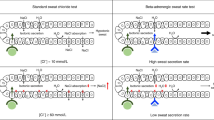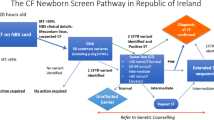Abstract
Neonatal hypertrypsinaemia with normal sweat chloride detected during CF screening may be related to trypsin activation. We have looked for mutations of the cationic trypsinogen (PRSS1) and pancreatic secretory trypsin inhibitor (PSTI) genes in 50 hypertrypsinaemic neonates with known CFTR genotypes and negative sweat test. No mutations were found in either gene. Two silent polymorphisms were detected in the PRSS1 gene. A polymorphism in the promoter region and an intronic polymorphism of the PSTI gene were found. No difference was observed in the frequency of PRSS1 or PSTI polymorphisms in neonates carrying or not carrying CF mutations. These results do not provide an indication for an increased frequency of mutations in the PRSS1 and PSTI genes in this group of neonates with transient hypertrypsinaemia.
Similar content being viewed by others
Introduction
Immunoreactive trypsinogen concentration measurement (IRT) in dried blood spots is commonly performed as a first step in neonatal screening for cystic fibrosis (CF).1 Infants with hypertrypsinaemia are then tested for the most common CF gene mutations: neonates carrying two CF-causing mutations, and infants with one CF mutation and a positive sweat test are diagnosed as affected. Neonates with raised trypsin levels at birth, one CF mutation and normal sweat electrolyte concentrations are usually considered to be carriers. However high IRT levels are not specific to CF, and they can occur also in newborns not carrying any common CF mutations. Thus, other factors, possibly genetic, could predispose to neonatal hypertrypsinaemia: genes associated with exocrine pancreatic function appear to be likely candidates. The cationic trypsinogen gene (PRSS1) codes for the major form of trypsinogen.2 The cleavage of the signal peptide leads to the activation of trypsinogen to trypsin, which subsequently converts all proteolitic proenzymes to their active form.3
Mutations in the PRSS1 gene have been associated with certain forms of hereditary pancreatitis (HP),4 a rare autosomal dominant disease with 80% penetrance and variable expressivity characterised by recurring episodes of severe abdominal pain often experienced by young patients.5 In particular, R122H, a missense mutation in exon 3 of the PRSS1 gene, abolishes the primary autolysis site of human trypsin, and it is clearly associated with HP.2,4 Also, mutation A16V in the PRSS1 gene, which interferes with the signal peptide cleavage, has been identified in chronic pancreatitis and in HP families with low penetrance.6 Other PRSS1 gene mutations have been reported to be associated with HP.7,8,9
Ockenga et al,10 have recently shown that mutations of the CFTR gene but not PRSS1 are associated with recurrent or chronic idiopathic pancreatitis. It is not clear if there are relationships between CFTR and PRSS1 in the determining pancreatitic phenotype.
Mutations in the pancreatic secretory trypsin inhibitor (PSTI, also known as serine protease inhibitor, Kazal type 1, SPINK1) gene which determine insufficient inhibition of trypsin have also been found in hereditary and in idiopathic chronic pancreatitis.11,12 In particular, PSTI gene N34S mutation has been detected in 18/96 unrelated children and adolescents with chronic pancreatitis,11 in 5/55 familial pancreatitis, and in 23/57 idiopathic chronic pancreatitis cases. 12
In this research we investigated whether mutations of the PRSS1 and PSTI genes are associated with neonatal hypertripsinaemia in newborns who had a normal sweat test.
Subjects and methods
The population under study consisted of 50 neonates from a CF neonatal screening programme cohort from North East Italy with IRT levels at birth above the 99.5th centile and normal sweat test as recently described for 47 of them.13
A panel of 15 common mutations, covering 85% of the CF alleles in our area, and denaturing gradient gel electrophoresis (DGGE) of all 27 exons and intron flanking regions of the CFTR gene had been previously performed as described for 18 of them,14 33 out of 50 neonates had one CFTR mutation from the panel, and 15 of them also had other CFTR gene mutations; 17/50 had no mutation from the panel, and seven of them had other CF mutations, as shown in Table 1.13,14
PRSS1 gene mutations R122H and A16V were analysed by enzymatic restriction with the appropriate endonuclease as described.4,6 PRSS1 gene exons 1–4 were analysed by DGGE as described,7 and exon 5 was analysed by direct DNA sequencing with Big Dye terminator kit (Perkin Elmer).
Mutation N34S in the PSTI gene was screened by restriction analysis of genomic DNA amplified by RG–PCR15 using the forward primer 5′-CAATCACAGTTATTCCCCAG-3′ and the modified reverse primer 5′-TGGTGCATCCATTAAGTACA-3′. The reverse primer creates a restriction site for the endonuclease SduI when the mutation is present.
The PSTI gene was also analysed by DGGE of the promotor region, the four exons, and intron–exon boundaries in 49 neonates, as described.16 Fragments which showed an altered migration pattern by DGGE analysis were directly sequenced using the BigDye terminator Cycle Sequencing kit (Perkin Elmer) on a 377 ABI PRISM sequencer (Perkin Elmer).
Results
PRSS1 gene
Cationic trypsinogen gene mutations R122H and A16V were not found, nor any other mutation reported to be associated with hereditary or idiopathic pancreatitis. Two polymorphisms in the PRSS1 gene were detected by DGGE analysis and DNA sequencing. Silent polymorphism 133807 C/T (numbering referred to the human beta TCR locus17) in exon 4, in 21 neonates, and silent polymorphism 134359 C/T in exon 5, in 22 neonates, were detected. The genotypes of the 50 neonates relative to the two polymorphisms are shown in Table 1.
PSTI gene
Restriction analysis demonstrated that the N34S PSTI gene mutation was not present in any neonate. DGGE analysis of the PSTI gene in 49 neonates and subsequent sequencing demonstrated the presence of two polymorphisms: −253T/C in the promoter region of the PSTI gene in 16 neonates, and IVS2-23A/T in intron 2 in two neonates. The genotypes of the 50 neonates relative to the two PSTI gene polymorphisms are shown in Table 1. The PSTI polymorphisms found in this group of hypertrypsinaemic neonates were found with the same frequency in a sample of 50 normal control individuals from the Italian population (16/50).
PRSS1, PSTI, and CFTR genes
In 33/50 neonates having ‘bona fide’ CF mutations (CFGAC site: www.genet.sickkids.on.ca/cftr/,18) 19 carried PRSS1 polymorphisms (133807 C/T and/or 134359 C/T) and 13 carried PSTI polymorphisms (IVS2-23 A/T and/or −253 T/C), while in 17/50 neonates not having ‘bona fide’ CF mutations 11 carried PRSS1 polymorphisms and four carried PSTI polymorphisms. The difference is not significant.
Discussion
This study was implemented following the speculation that newborns with neonatal hypertrypsinaemia could carry particular PRSS1 and PSTI gene mutations depending on the presence or the absence of CF-causing mutations. The implication of CFTR gene mutations in the development of transient hypertrypsinaemia was already described.13,14
This study detected the presence of polymorphisms in the PRSS1 and in the PSTI genes in hypertrypsinaemic neonates. These polymorphisms do not seem to have a functional significance in gene expression or disease modification and have been previously reported not to be related to hereditary pancreatitis or sporadic chronic pancreatitis.8,11,12
The results of this study do not show evidence for PRSS1 or PSTI gene mutations in the group of neonates with hypertrypsinaemia here described. We observed an homogeneous distribution of PRSS1 or PSTI polymorphisms in neonates carrying or not carrying CFTR gene mutations.
References
Dankert-Roelse JE : Neonatal screening. in Dodge JA, Brock DJH, Widdicombe JH (eds). Cystic fibrosis-current topics, Chichester: Wiley, 1994, pp 303–318.
Chen J-M & Ferec C : Molecular basis of hereditary pancreatitis. Eur J Hum Genet 2000; 8: 473–479.
Steer ML & Meldolesi J : The cell biology of experimental pancreatitis. N Engl J Med 1987; 316: 144–150.
Whitcomb DC, Gorry MC & Preston RA et al: Hereditary pancreatitis is caused by a mutation in the cationic trypsinogen gene. Nat Genet 1996; 14: 141–145.
Perrault J : Hereditary pancreatitis. Pediatr Gastroenterol 1994; 23: 743–752.
Witt H, Luck W & Becker M : A signal peptide cleavage site mutation in the cationic trypsinogen gene is strongly associated with chronic pancreatitis. Gastroenterology 1999; 117: 7–10.
Ferec C, Raguénès O & Salomon R et al: Mutations in the cationic trypsinogen gene and evidence for genetic heterogeneity in hereditary pancreatitis. J Med Genet 1999; 36: 228–232.
Teich N, Mössener J & Volker K : Mutations of the cationic trypsinogen in hereditary pancreatitis. Hum Mut 1998; 12: 39–43.
Chen JM, Piepoli Bis A & Le Bodic L et al: Mutational screening of the cationic trypsinogen gene in a large cohort of subjects with idiopathic chronic pancreatitis. Clin Genet 2001; 59: 189–193.
Ockenga J, Stuhrmann M & Ballman M et al: Mutations of the cystic fibrosis gene, but not cationic trypsinogen gene, are associated with recurrent or chronic idiopathic pancreatitis. Am J Gastroenterol 2000; 95: 2061–2067.
Witt H, Luck W & Henies HC et al: Mutations in the gene encoding the serine protease inhibitor, Kazal type1 are associated with chronic pancreatitis. Nat Genet 2000; 25: 213–216.
Pfutzer RH, Barmada MM & Brumskiel APJ et al: SPINK1/PSTI polymorphism act as disease modifiers in familial and idiopathic chronic pancreatitis. Gastroenterology 2000; 119: 615–623.
Castellani C, Benetazzo MG, Tamanini A, Begnini A, Mastella G & Pignatti PF : Analysis of the entire coding region of the cystic fibrosis transmembrane regulator gene in neonatal hypertrypsinaemia with normal sweat test. J Med Genet 2001; 38: 202–205.
Castellani C, Benetazzo MG, Bonizzato A, Pignatti PF & Mastella G : Cystic fibrosis mutations in heterozygous newborns with hypertrypsinaemia and low sweat chloride. Am J Hum Genet 1999; 64: 303–304.
Gasparini P, Bonizzato A, Dognini M & Pignatti PF : Restriction site generating-polymerase chain reaction (RG–PCR) for the probeless detection of hidden genetic variations: application to the study of some cystic fibrosis mutations. Mol Cell Probes 1992; 6: 1–7.
Chen JM, Mercin B, Andrezet MP & Ferec C : Mutational analysis of the human pancreatic secretory trypsin inhibitor (PSTI) gene in hereditary and sporadic chronic pancreatitis. J Med Genet 2000; 37: 67–69.
Rowen L, Koop BF & Hood L : The complete 685-kilobase DNA sequence of the human beta cell receptor. Science 1996; 272: 1755–1762.
Bombieri C, Giorgi S & Soukeyna C et al: A new approach for identifying non-pathogenic mutations. An analysis of the cystic fibrosis transmembrane regulator gene in normal individuals. Hum Genet 2000; 106: 172–178.
Acknowledgements
Partially financed by Italian Ministry of Instruction, University and Research (MIUR), and Italian Health Ministry, CF Project law 548/93, and ISS National Project for quality control of genetic tests law 502/92. We wish to thank Dr G Uomo (Naples, Italy) for PRSS1 gene mutation R122H DNA control sample, and Dr Claude Ferec (Brest, France) for mutations samples for all the five exons of the PRSS1 gene. We also thank Fondazione Fibrosi Cistica for supporting this study.
Author information
Authors and Affiliations
Corresponding author
Rights and permissions
About this article
Cite this article
Patuzzo, C., Castellani, C., Sagramoso, C. et al. Cationic trypsinogen and pancreatic secretory trypsin inhibitor gene mutations in neonatal hypertrypsinaemia. Eur J Hum Genet 11, 93–96 (2003). https://doi.org/10.1038/sj.ejhg.5200927
Received:
Revised:
Accepted:
Published:
Issue Date:
DOI: https://doi.org/10.1038/sj.ejhg.5200927



